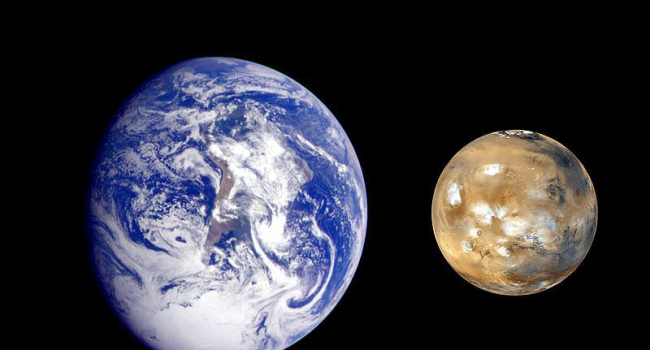
How does Mars affect Earth and its climate?
Researchers claim that Mars' gravitational pull might be strong enough to perturb Earth's ocean, shifting its deposits within a 2.4-million-year climate cycle.
It has long been known that Earth's orbit around the Sun influences the planet's climate, with cycles spanning thousands of years. Adriana Dutkiewicz from the University of Sydney and her colleagues have identified a "Great Cycle" lasting 2.4 million years, which they believe is governed by Mars and impacts Earth's ocean currents for at least 40 million years.
Evidence for this cycle comes from nearly 300 deep-sea drill cores revealing changes in ocean sediment deposition. Oceanographers expected sediment to accumulate in stable layers during periods of consistent ocean currents, but unusual currents and eddies have led to accumulation in other regions.
According to the team, gaps or interruptions in sedimentation coincide with periods when Mars' gravity exerts its maximum influence on Earth, slightly affecting our planet's orbital stability. This alters solar radiation levels and climate, manifesting in stronger ocean currents and eddies.
Team member Ditmar Müller, also at the University of Sydney, acknowledges that the distance between Earth and Mars is so vast that significant gravitational effects are hard to imagine. "But there are many factors that can amplify even slight changes. Mars' influence on Earth's climate is akin to the butterfly effect," he says.
Benjamin Mills from the University of Leeds (UK) notes that drill cores provide evidence of "megacycles" in global environmental changes. "Many of us have observed the outcomes of these cycles, lasting millions of years, in various geological, geochemical, and biological data, including during the 'explosion of life' in the Cambrian period. This work helps solidify our understanding of ecological changes," he adds.
However, Matthew England from the University of New South Wales in Sydney suggests that while he believes this study contributes to understanding climate cycles on a geological scale, the conclusions of the article did not convince him. "I am skeptical about the connection to Mars, considering its gravitational attraction to Earth is very weak — just one-millionth that of the Sun. Even Jupiter has a stronger gravitational influence on Earth," he concludes. England also notes that even if Mars does exert an influence, it is negligible compared to climate changes caused by anthropogenic factors.
- Related News
- Wheel of Death: new method will help astronauts stay fit in low gravity
- Due to anomalies of Orion spacecraft, lunar exploration program may be delayed for years։ NASA
- TAO Observatory: World's highest telescope to study evolution of galaxies and exoplanets
- Powerful M9.5 solar flare causes radio blackout in Pacific Ocean
- What will happen to the Earth if the Moon disappears?
- Key to conquering the Red Planet: Why is NASA studying solar storms on Mars?
- Most read
month
week
day
- Digital Julfa Network is launching a pan-Armenian centre in the metaverse, on the Fastexverse virtual platform 1015
- Xiaomi unveils exclusive Redmi Note 13 Pro+ dedicated to Messi and Argentina national team 899
- Sparkles: Boston Dynamics unveils a furry robot dog that can dance (video) 842
- Internet 500 times faster than 5G tested in Japan: It allows to transfer five movies in HD resolution in one second 732
- Is there a ninth planet in the solar system? Scientists find new evidence 708
- What will happen to the Earth if the Moon disappears? 703
- iPhone 16 may get colored matte glass back panel, 7 colors 683
- How to understand how protected a smartphone is from water and dust? 676
- Which smartphones will be the first to receive Android 15? 661
- Great value for money: 3 best Realme smartphones 653
- Archive
